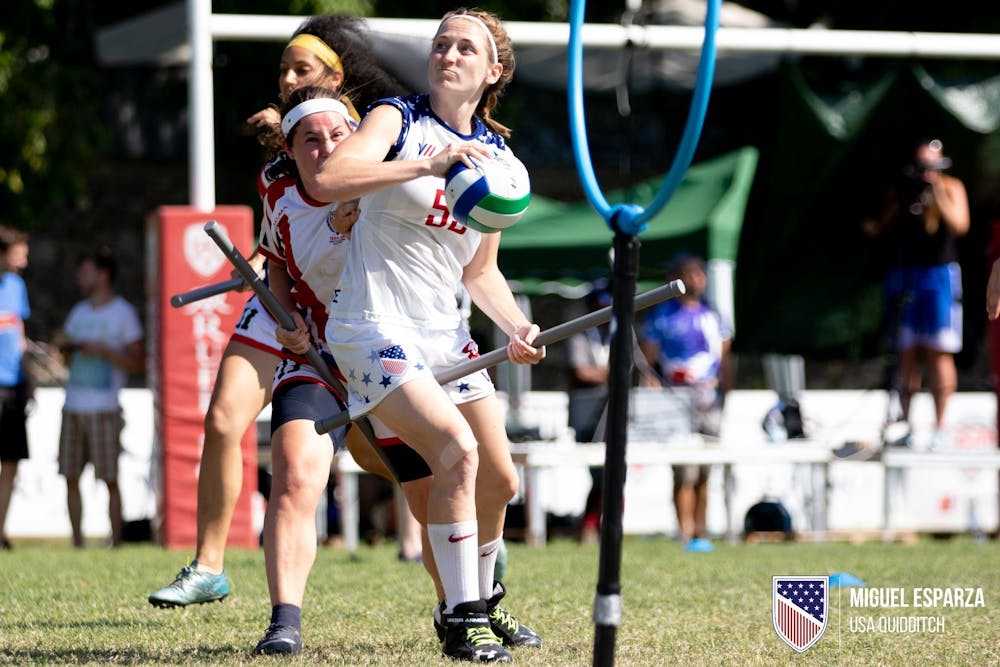An alumna from the University of Richmond, Julia Baer, who graduated in 2015, is a member of the U.S. Quidditch national team and will be participating in the 2020 Quidditch World Cup.
The event is coincidentally being held in Richmond over the summer, reflecting the notion that Quidditch has gone through a lot of growth over the past decade.
“Quidditch has moved and migrated quite far from its origins in Harry Potter,” Baer said, who graduated from UR in 2015. “If you were to stumble across it and had no idea what it was, you would struggle to make the connection immediately.”
Quidditch’s growth can be seen in the establishment of the International Quidditch Association in 2010. In Richmond this past summer, the IQA hosted the first-ever IQA Pan-American games, bringing teams from across the Americas to compete, according to U.S. Quidditch.
Participation in the Quidditch World Cup has increased, from 21 countries in 2016 to 29 teams representing their countries in 2018.
Instead of brooms, quidditch players use PVC pipe, which is a lightweight, strong and durable plastic piping, a suitably modern replacement for the broomsticks previously used in quidditch, Baer said. Additionally, the UR quidditch team is now named the Spiders, rather than the Acromantulas, its former name, which was a reference to the giant magical species of spider in the Harry Potter series, Baer said.
Junior Chris Barry has been a member of the club for three years and is one of the captains of the quidditch team.
“One of the biggest changes has been the pitch, how the field has changed,” Barry said. “It used to be that you had two boundaries and a soft oval boundary and then a hard rectangle boundary, and now it’s just become one hard rectangle boundary.”
Barry said these changes to the field represented the sport making itself more accessible and more easily understandable for people who were just watching but also people who were trying to join the sport. With the simplified rules, the sport is more likely to grow out of the niche platform it once catered to, Barry said.
Junior Karl Zoubek, a captain of the team, has been playing quidditch since his first year at UR. Zoubek described quidditch as a “mishmosh” of different sports, because in quidditch there are elements of a lot of sports, such as rugby and soccer, bundled into one.
Zoubek said the standardization of rules had been what had started the process of quidditch becoming a “real” sport, as it moved away from what Zoubek described as its admittedly nerdy background.
He described the changes in rules as a way the sport is evolving to make itself more accessible. The modification of the pitch demonstrated to him that quidditch was creating a more standardized way to play, Zoubek said.
Enjoy what you're reading?
Signup for our newsletter
“Even today the NCAA changes the rules every so often, and even professional sports, a couple years ago they changed the overtime rules in the National Football League,” Zoubek said. And although quidditch may not yet be at the same level of popularity as football, it still provides tremendous opportunities for people such as Baer.
Part of Baer’s motivation to play quidditch was the opportunity to reach international competition within a few years of starting, and there are very few other sports that offer that chance, she said.
But, even considering the fact that quidditch isn’t the most competitive sport in the world, reaching international competition is rightfully difficult.
“Quidditch is the type of sport that has a really steep learning curve,” Baer said. “Nobody grows up playing it. It’s really tough to master the sport from the start. There’s a lot of things going on on the field.”
Despite originating in Harry Potter, quidditch has the seriousness that is attributed to other professional sports.
When it comes to the international level, quidditch practice is “100% all business,” Baer said.
“The whimsy is largely lost,” she said. “Which is good.”
Recently, Richmond has been a hotbed of quidditch activity, from hosting the Pan-American Games last summer to hosting the World Cup this upcoming summer.
Returning to Richmond this past summer for the IQA Pan-American Games was an emotional experience, Baer said.
“Eight years ago, I didn’t even know what quidditch was,” Baer said. “I learned it in that city, I learned it at Richmond. I had no idea where I would be years later, and it turns out that I was going to be right back in Richmond, representing the country in that same sport.”
Contact sports writer Jake Seares at jake.seares@richmond.edu.
Support independent student media
You can make a tax-deductible donation by clicking the button below, which takes you to our secure PayPal account. The page is set up to receive contributions in whatever amount you designate. We look forward to using the money we raise to further our mission of providing honest and accurate information to students, faculty, staff, alumni and others in the general public.
Donate Now



